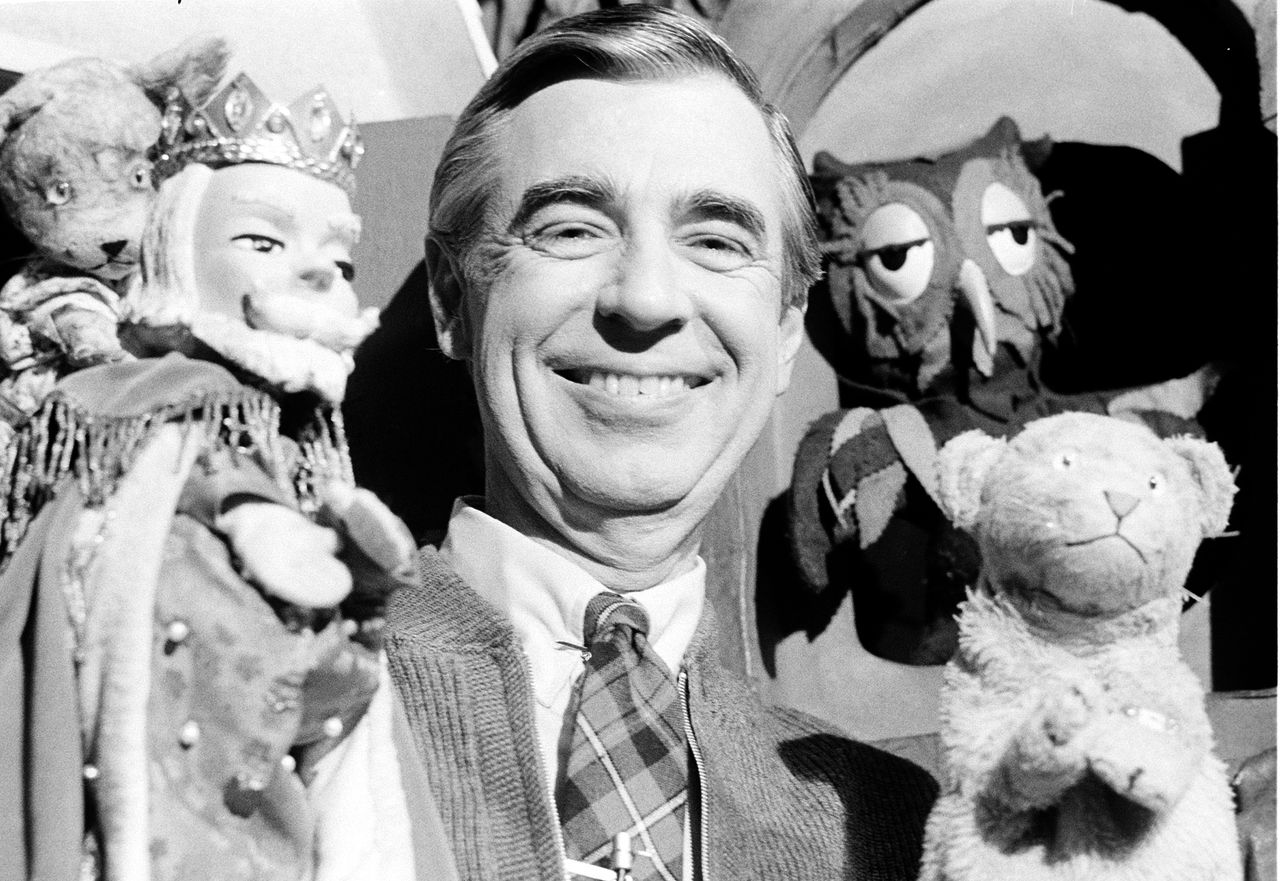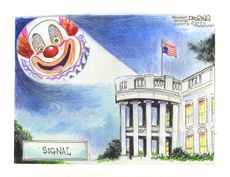The making of Mister Rogers
Fred Rogers grew up a lonely boy who spent much of his time in his room. His radical mission was to convince kids, "I like you just the way you are."

Adapted from an article that originally appeared in The New York Times Magazine.
Up at the castle, in front of the cameras, the puppets were eagerly preparing for a festival. They bopped happily along the pretend stone wall. But there was a buzz kill: King Friday XIII, the mighty ruler in his bright purple cape, decreed that the festival would be a bass-violin festival.
"But you're the only one who plays the bass violin," one of the neighbors pointed out.
Subscribe to The Week
Escape your echo chamber. Get the facts behind the news, plus analysis from multiple perspectives.

Sign up for The Week's Free Newsletters
From our morning news briefing to a weekly Good News Newsletter, get the best of The Week delivered directly to your inbox.
From our morning news briefing to a weekly Good News Newsletter, get the best of The Week delivered directly to your inbox.
"Oh, so I am," the king replied. "Well, it looks like I'll have a very large audience."
Fred Rogers was on his knees behind the castle, dressed all in black, working the puppets, his posture straight as a soldier's, lips pursed tight as he voiced the king. There were cushions strewn on the floor and blocks of foam rubber taped to the parts of the castle where he tended to bonk his head. In one swift movement he crouched, slipped off the king, slid on another puppet. He shot his arm up, returned to his knees, but this time he slouched, his face softening as he voiced the meek and bashful Daniel Striped Tiger.
And so the neighbors scrambled about trying to figure out a way to be part of the festival. Stumped, and on the sly, they began to invent bass-violin acts they might contribute. One dressed up her accordion to look like a bass violin, another practiced a dance with one, another tried to turn herself into one by wearing a big fat bass-violin suit. Another, a goat, recited a bass-violin poem in goat language. ("Mehh.")
Was this okay? Would the king approve?
Sign up for Today's Best Articles in your inbox
A free daily email with the biggest news stories of the day – and the best features from TheWeek.com
He did. In fact, he was delighted. It turned into a most rockin' bass-violin festival, neighbors singing and twirling with pretend and real bass violins (including a puppet holding a bass-violin puppet), around balloons with little cardboard handles taped to them to look like bass violins, to rousing bass-violin/accordion polka tunes accompanying bass-violin-inspired goat poems.
"If you didn't know what was going on," one of the guys on the crew said, "this could be a very weird situation."
I appreciated that. I worked for a different department in the building, at WQED in Pittsburgh, down the hall. They had microwave popcorn in the cafeteria. To get to the popcorn you had to walk by Studio A, and there was usually the blue castle parked outside it for storage. If the castle wasn't there, you knew they were taping inside, and sometimes you heard music. It was fun to go in and watch, if only to take in the live music, usually jazz, and to marvel at the bizarro factor. Like Fellini for preschoolers. My brother-in-law Hugh Martin had worked as director and producer of the program for a couple of years. He was long gone, had moved to New York, but he credited Fred with starting his career. Fred loved Hugh — so by association people were nice to me. It helped. I was 26, just out of grad school.
I wanted to ask Fred how he came up with the idea for goat poems. Whose day allows them to sit around thinking about accordions dressing up like bass violins? The first time I talked to him in his office, one floor up from Studio A, I tried to get him to explain. He kept turning the focus on me. It took us a while to get past the deflection match. He asked me about grad school. I hardly wanted to think about that, about the dark cloud hovering over my feelings about my time there. I asked him what he was working on. Any new scripts or songs?
He put his eyebrows up. "It's so hard, isn't it?" he said. "I think there are many people who bring a whole lot of baggage from their past and a whole lot of anxiety about the future to the present moment. What's so great is that people can be in relationship with each other for the now."
"Yeah," I said.
"If we can somehow rid ourselves of illusions," he said. "The illusion that we are greater or lesser than we are. The illusion that we're going to save the world. There are a lot of illusions that people walk around with. I would love to be able to be present in every moment I have."
I distinctly remember having little more to offer than, "Yeah."
His office was more like a living room. No desk, just his easy chair and a soft brown couch — plus a flowering peace plant, a piece of driftwood, a miniature sandbox and other random gifts people had brought him over the years, many of which he pointed out, then told stories about the people who gave them to him.
"I think the greatest thing about things is they remind you of people," he said.
I supposed so. And more so as I thought about it.
"I want to tell you about my tie," he said. He lifted it up and looked at it. "Do you know what this tartan is? This tartan is the clergy tartan. I suppose if somebody were Scottish, they would recognize it. But I don't think most people know. I wear this tie more than any other. Maybe I just feel, you know, that it represents a big part of who I am."
Muted lavender and light blue, the clergy tartan is one traditionally worn only by people involved in ministry. Fred said it was a gift from Bill Barker, one of his closest friends and the minister who gave the charge at Fred's ordination in the United Presbyterian Church in 1963: "We charge you to shake us through a God who involves Himself in our world, into the world where He already is. ... This world of TV cameras, of puppets, of children, of parents, of studios, of directors, of actors, this [too] is God's world. ... We, as the Church, charge that you speak to us to disturb us. ... We charge you to speak to us to remind us that we too, through you, must be involved."
"So the show is like your church?" I asked Fred.
"An atmosphere," he said. What he was trying to create with Mister Rogers' Neighborhood was "an atmosphere that allows people to be comfortable enough to be who they are." He continued: "I really don't want to superimpose anything on anybody. If people are comfortable in that atmosphere, they can grow from there, in their own way.
"A lot of this — all of this — is just tending soil."
Fred Rogers was a curious, lanky man, six feet tall and utterly devoid of pretense. He liked to pray, to play the piano, to swim, and to write, and he somehow lived in a different world than I did. A world of simple words and deceptively simple concepts, and a slowness that allowed for silence, focus, and joy. We became friends for some 20 years, and I made lifelong friends with his wife, Joanne. I remember thinking that it seemed as if Fred had access to another realm, like the way pigeons have some special magnetic compass that helps them find home.
Fred died in 2003, somewhat quickly, of stomach cancer. He was 74. It was years after his death that he would, suddenly, go from a kind of lovable PBS novelty to an icon on the magnitude of the divine. It happened so fast that it was easy to gloss over his actual message.
"Just don't make Fred into a saint." That has become Joanne's refrain. She's 91 now, still a bundle of energy, lives alone in the same roomy apartment, in the university section of Pittsburgh, that she and Fred moved into after they raised their two boys. She's funny. She laughs louder and bigger than just about anyone I know. Throughout her 50-year marriage to Fred, she wasn't the type to hang out on the set at WQED or attend production meetings. That was Fred's thing. He had his career, and she had hers as a concert pianist. For decades she toured the country with her college classmate, Jeannine Morrison, as a piano duo; they didn't retire the performance until 2008.
"If you make him out to be a saint, people might not know how hard he worked," Joanne said. Disciplined, focused, a perfectionist — an artist. That was the Fred she and the cast and crew knew. "I think people think of Fred as a child-development expert," David Newell, the actor who played Mr. "Speedy Delivery" McFeely, told me recently. "As a moral example maybe. But as an artist? I don't think they think of that."
That was the Fred I came to know. Creating, the creative impulse, and the creative process were our common interests. He wrote or co-wrote all the scripts for the program — all 33 years of it. He wrote the melodies. He wrote the lyrics. He structured a week of programming around a single theme, many of them difficult topics, like war, divorce, or death.
I don't know that he cared whether people saw him as an artist. He seemed more intent that people not see him at all. The focus was always on you. Or children. Or the tiny things. It was hard to see Fred. I remember those first days in his office, learning about soil, illusions, giving and receiving, concepts that would go on to rattle through me like drumbeats. It would take me years to understand it all, to see how those blocks fit together, to recognize just how radical his message was.
I like you just the way you are. One day he told me where that core message came from. His grandfather, Fred Brooks McFeely, who like the rest of the Rogers family lived in Latrobe, Pennsylvania, about 40 miles east of Pittsburgh. "He was a character," he said. "Oh, a lot of me came from him."
His grandfather represented a life of risk and adventure, the very things Fred's boyhood lacked. He was a lonely kid, an only child until he was 11, when his sister came. He was bullied. Here comes Fat Freddie! He was sickly. He had rheumatic fever. He had asthma. He was not allowed to play outside by himself. He spent much of his childhood in his bedroom.
He had music, and he had puppets to keep himself amused. He didn't need much. He was expected to fill his father's shoes, become his business partner at the brick company. "My dad was pretty much Mr. Latrobe," he told me. "He worked hard to accomplish all that he did, and I've always felt that that was way beyond me. And yet I'm so grateful that he didn't push me to do the kinds of things that he did or to become a miniature version of him. It certainly would have been miniature."
Fred wanted to be like his grandfather. "He taught me all kinds of really neat stuff!" he told me. "I remember one day my grandmother and my mother were telling me to get down, or not to climb, and my grandfather said: 'Let the kid climb on the wall! He's got to learn to do things for himself!' I heard that. I will never forget that. What a support that was. He had a lot of stone walls on his place."
Joanne came into Fred's life in college. They were music majors together at Rollins College in Winter Park, Florida, and after graduation they lived in New York. Fred was hoping to work as a composer but had become intrigued by the nascent medium of television. He worked his way up to network floor manager at NBC before learning about a start-up, the nation's first community-sponsored television station, WQED in Pittsburgh. Despite warnings from people at NBC who told him he was crazy — "That place isn't even on the air yet!" — he moved to Pittsburgh in 1953, and he and Joanne bought a red-brick house.
He brought out his puppets. He found something important for them to say, thanks in large part to the person who would become his lifelong collaborator, Margaret McFarland, at the University of Pittsburgh. Along with her colleagues Benjamin Spock and Erik Erikson, McFarland revolutionized the study of childhood development. She helped Fred explore the emotional landscape of children. "Anything human is mentionable, and anything mentionable is manageable," she would repeatedly tell him. She provided an intellectual framework for what Fred learned from his grandfather.
"I think it was when I was leaving one time to go home after our time together," Fred told me, "that my grandfather said to me: 'You know, you made this day a really special day. Just by being yourself. There's only one person in the world like you. And I happen to like you just the way you are.'"
Fred and I commiserated about the creative process. We would often sit and talk about confronting the blank page, the blank canvas, the blank song sheet. That place of vast possibility and bottomless terror. "Why is it so scary?" he would say. "It's so hard." Fred saw creating as a divine act. He believed that the creative process was a fundamental function at the core of every human being.
A local opera company in Pittsburgh recently decided to stage two one-act operas written by Fred. Over the course of his life, he wrote 13 of them. He would weave them into a week of programming. It didn't matter that the puppets could barely sing; the point was the process of making an opera, not the performance. Joanne told me she was going, and she said she would save me a seat.
At intermission I ran into Newell. He told me something I never knew. He said one thing Fred talked to him about was the idea of one day writing a stage musical. A real musical for an adult audience. It was a lifelong dream. He said Fred talked about getting started on it. But then came the cancer. "And he was gone so quick."
That hit me. The idea that Fred believed he had another act. That he had more creating to do. Maybe a lot more. People often wonder what Fred would think of the world today, which can seem so far removed from his vision of bridges, love, a healthy atmosphere. Maybe he would have despaired and given up on it, people say. I don't think so. Just the opposite. I think right now, Fred would be feverishly creating bridges and bridges and bridges.
-
 Today's political cartoons - March 29, 2025
Today's political cartoons - March 29, 2025Cartoons Saturday's cartoons - my way or Norway, running orders, and more
By The Week US Published
-
 5 tactically sound cartoons about the leaked Signal chat
5 tactically sound cartoons about the leaked Signal chatCartoons Artists take on the clown signal, baby steps, and more
By The Week US Published
-
 Roast lamb shoulder with ginger and fresh turmeric recipe
Roast lamb shoulder with ginger and fresh turmeric recipeThe Week Recommends Succulent and tender and falls off the bone with ease
By The Week UK Published